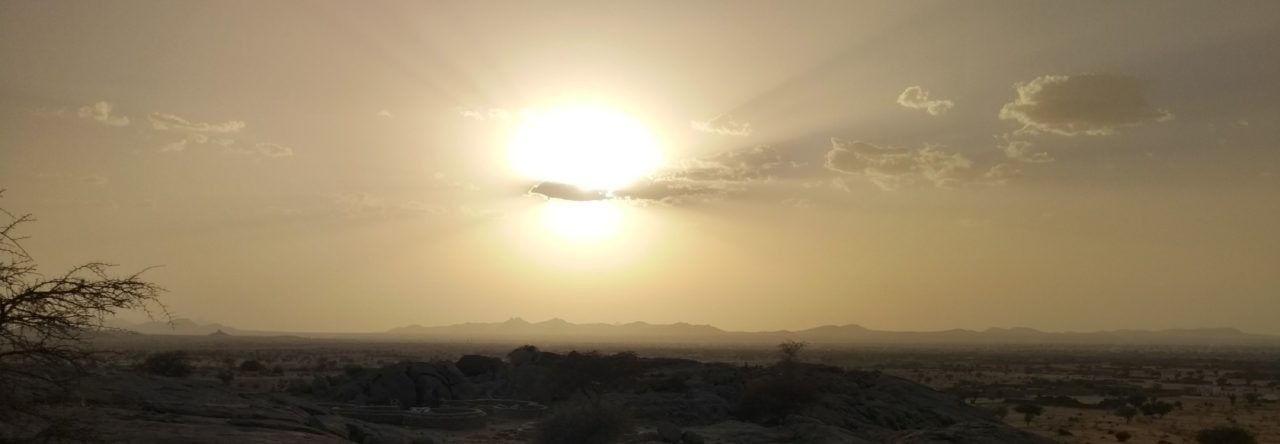A few weeks ago Isaac and I joined a group of friends for a 35km trip south of town to the large wadi (seasonal river) from which our town gets water. We had a great time, and learned a lot too. It felt a lot like a field trip in school.
The water is initially pumped from the wadi into a treatment station a few hundred yards away. Even during the dry season, there is water running underneath the wadi.

Most of the year, this is a river of sand, with the water retreating beneath the surface after the rains are gone.
There is a road, made of stones, that crosses the wadi, which is currently submerged under 6 inches of water.

The road crossing the wadi.

What mud?
Although not really planning on Isaac getting muddy from head to toe, I should have known better. As soon as they saw it, the kids catapulted themselves into the muddy water and we could only watch helplessly from the edge. “Oh well”, I thought, “at least there aren’t any crocodiles or hippos.” A little further south, the rivers have their share of both.
So after checking out the wadi, and Isaac falling into the muddy water several times, we headed back up to the treatment plant. We had gathered quite a crowd by that point, as is pretty normal when a group of white people are found wandering around in rural Chad.

Drawing a crowd…
So after waiting a few minutes for permission from the boss of the plant to give us permission, we entered the plant. You could hear the loud drone of the 810 KVA Caterpillar diesel generator that provides the power for the processing at the plant.

Diesel generator that powers the water treatment facility.
Of course a diesel generator is useless without diesel fuel, so there are two gigantic tanks for storing the stuff.

How long could I run the generator at my house with one of these?

Not the filter, but a date palm. Guess you can grow anything with limitless water.
Then on to the giant filter that filters out sand, debris, and who knows what else from the water that is pumped in from the wadi. This part of the process also adds calcium to the water (unless my French fails me). Why calcium? Why not eliminate giardia, amoebas, parasites, etc. at this point? If you drink a lot of this water in Abeche, you’ll know very soon that these things are alive and well, and you’ll have plenty of time to catch up on reading as you spend your days in the bathroom. Yes, I do speak from experience.
At last, after the filtering process the water is sent out to Abeche through four large pumps. This water travels 35 km and is stored in a large cement tank in Abeche until used.

Pumping water to Abeche
Water is a very interesting topic when you have to work so hard to get it. Of course, similar processes are involved in the U.S., but I always just took for granted that when I turned the faucet on, water came out. Magic. Endless. But now, when water comes from the city (a new phenomenon for us since the coming of rainy season), we scramble to fill up everything capable of holding water, not really knowing when water will be available again. When water isn’t available at our house from the city, we pay to have someone bring it by push cart, as I’ve mentioned before. So either way, we have a new appreciation for water.
And compared to those living in rural villages, we have it easy. Many women and girls walk miles to get water from wells during the dry season, which is most of the year. They carry it on their shoulders, or on the backs of donkeys. As has so often been the case since arriving here, stories from the Bible have come alive to us since the culture here hasn’t changed in many ways since Bible times. The daughters of Jethro trying to get water and being chased away by shepherds until Moses intervened, the Samaritan woman at the well, etc.
Please pray that we’ll be able to effectively relate these stories and others to the people here, and point them to the source of Living Water so that they will never thirst again.
















